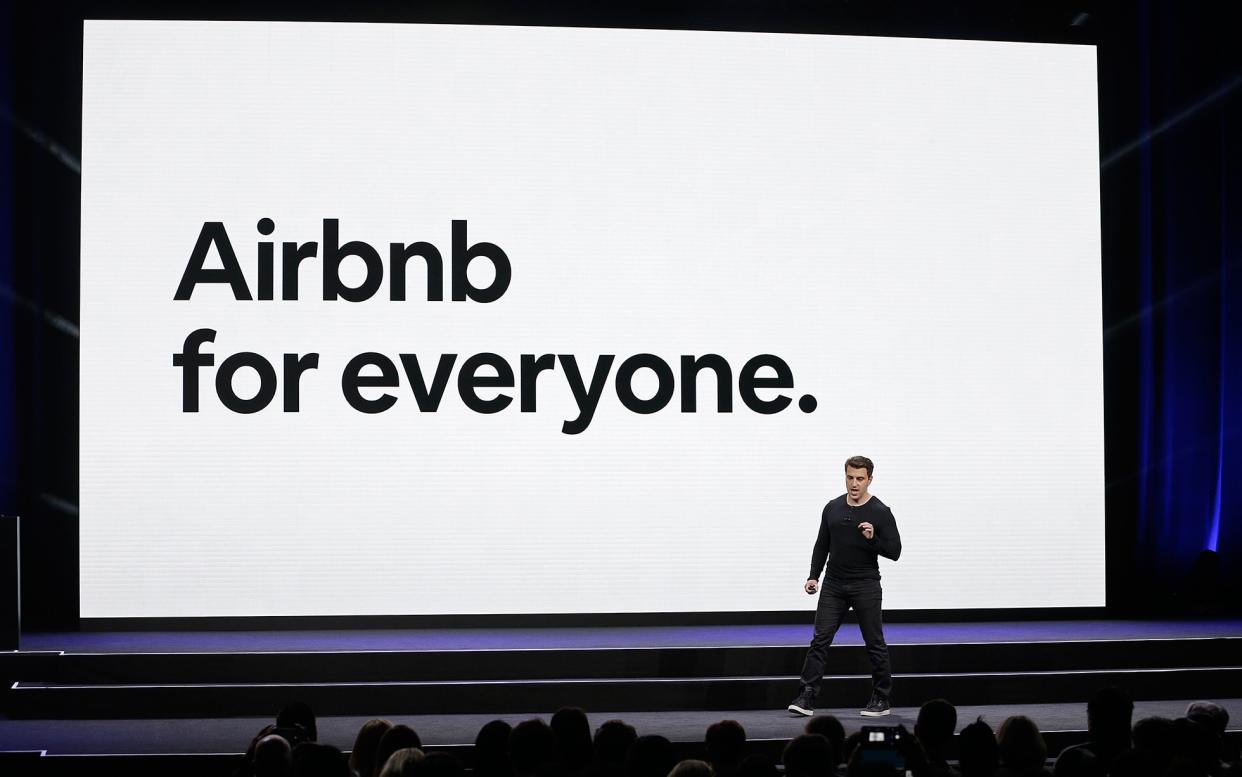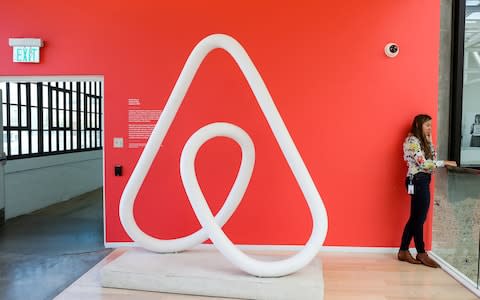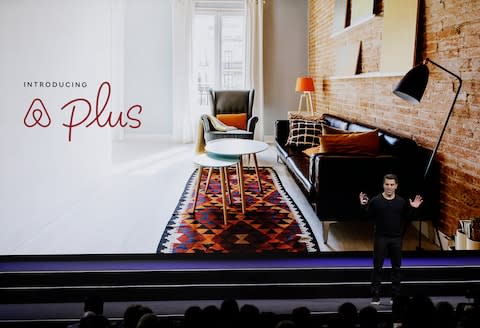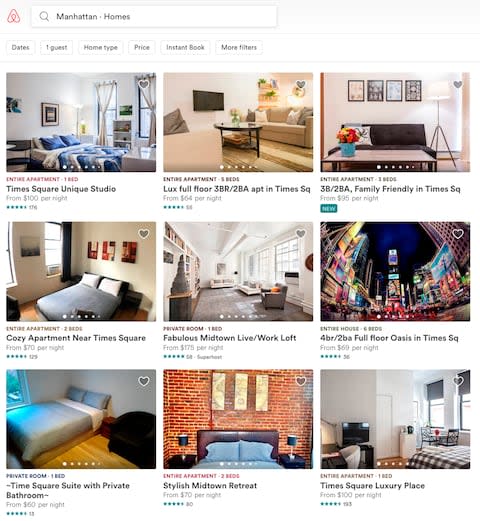Airbnb abandons humble flat-sharing origins with move to offer hotel stays

In the most aggressive move in their 10-year history, Airbnb has expanded to include boutique hotels, luxury rentals and bespoke tour itineraries, distancing itself further from its humble couch-surfing origins.
The goal of the new services, according to CEO Brian Chesky, is to make Airbnb appeal to business travellers and high net-worth customers, not just those looking for budget-friendly hotel alternatives.
“Airbnb is still an alternative,” said Chesky, at a press conference yesterday in San Francisco’s Masonic Hall. “We still haven’t done the ‘everyone’ part... until now.”
For the rest of his keynote speech, Chesky announced developments like hotel bookings, tour offerings and guest loyalty programs that bring Airbnb much closer to the hotel and tourism industry it has long been accused of disrupting.
Ardently courting the brand of discerning travellers who would previously have dismissed the site as a jumble sale of unvetted properties, Airbnb are adding two new luxury tiers, Airbnb Plus and Beyond by Airbnb.

Airbnb Plus is an individually inspected portfolio of properties with impeccable design credentials, standardised amenities including speedy Wi-Fi, and top marks for cleanliness and comfort. All Airbnb Plus homes come with concierge support, making the company a direct competitor to ‘hometel’ services such as Buenos Aires-based Oasis Collections and London-based Onefinestay. The average Airbnb Plus property nightly rate remains under $250 (£179), but the company guarantees a minimum level of quality.

Beyond by Airbnb, also unveiled yesterday, is the result of the company’s acquisition of Luxury Retreats in 2017, offering high-end holiday properties, travel and experiences, when it launches in spring. With the launch of Airbnb guided ‘experiences’ in November 2016 Airbnb had already moved beyond accommodation and into peer-to-peer tour operation, but this brings Airbnb even closer to being a full-service travel booking site. “Our vision is to be the homepage for travel,” is how Natalie Schwartz, Head of Global Marketing, puts it.
In the biggest revamp of the app and website in years, Airbnb is also making it easier for users to navigate its site and search for suitable properties. Beyond the outdated ‘private room’ and ‘entire home’ options, Airbnb are adding four new categories of listings: vacation homes, boutique, B&B, and ‘unique’, which applies to quirky listings like treehouses, yurts and boats.

“What we wanted to do with this launch is reframe why people come to the platform,” said Director of Engineering Surabhi Gupta. “There are a bunch of guests that don’t consider us yet, because they think, ‘Airbnb doesn't have a product for me’. We do have a product for a whole spectrum of travellers, but in the past we haven't made it easy for guests to find those options.”
Chesky’s announcement this week marks a significant change to Airbnb’s business model, which has been traditionally associated with millennial travellers, digital nomads and peer-to-peer flatsharing.

Back in 2007, when 27-year-old founders and friends from Rhode Island School of Design Joe Gebbia and Chesky realised that hotels were fully booked over the Industrial Design Conference in 2007, they spied an opportunity to help them cover their rent that month, invested in air mattresses, and knocked up a basic website. Offering a clean, functional place to stay for $80 a night, they housed three guests on their floor. During their foray into opportunistic hospitality, they observed that there was no way to see in real time what was open where, and to be able to book it on the spot... and Airbnb was born.
On Airbnb’s biggest night in 2008, 100 guests stayed on Airbnb, almost all of them in Denver for the 2008 Democratic National Convention. Ten years later, on Airbnb’s biggest night in 2017, three million people stayed in an Airbnb property in almost 20,000 cities around the globe.
These are the 10 most in-demand Airbnbs in the world
Within the travel industry, the news that Airbnb - considered a direct challenger to hotels - is now including independent hotels on their platform will come as a surprise. In fact, hoteliers and B&B owners have been listing their rooms on the platform for years, and guests would regularly turn up expecting to find a private home, only to realise their room is in fact in a hostel or family-run hotel.
“But today we’re announcing that we’re committed to helping boutique, independently-run hotels grow their business and deliver what guests want,” says Cameron Houser, Airbnb’s Progamme Manager for Hotels, a brand new role created just last year. It seems that small hotels, unable to beat Airbnb, have decided to join them.
“It’s my job to look at how we can help guests know exactly what sort of property they’re walking into, and help these boutique hotels become more successful, and give them a home, a platform, on Airbnb,” says Houser.
How it works | Renting your property on Airbnb
Nevertheless, this move brings the site closer to online travel agencies (OTAs) such as Expedia, booking.com and lastminute.com. These big-hitter OTAs will be far from thrilled, particularly as Airbnb’s expanded offering is expected to undercut the larger commissions taken from hotels by sites such as Expedia and booking.com.
In just under a decade, Airbnb has gone from a website for couch surfers to accommodating Beyonce the night of the Superbowl in a $10,000-per-night listing. It lists roughly 4.5 million homes for rent in more than 81,000 cities, and Airbnb hosts have earned $41bn (£29.4bn) over the past 10 years. However, this exponential growth has sparked increasing scrutiny from city regulators. The company has been engaged in legal battles with local governments in cities from San Francisco to New York to Amsterdam. Regulators argue that Airbnb’s short-term rental model drives up rents, creating problems for residents searching for long-term accommodation.
Airbnb's highest earning landlords
Despite these battles, Airbnb has long revelled in its status as a disruptor to the conventional tourism trade, a hip alternative to the hotel market. But as the company prepares to go public, which could happen as early as 2019, Airbnb seems keen to shed this image and be taken seriously as a major and mainstream player in the travel market. There might still be a few air mattresses on the site, but as it turns 10, Airbnb has turned decisively Squarebnb.